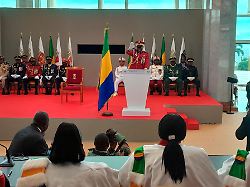Change of power is official
Gabon’s coup general sworn in as interim president
9/4/2023 4:23 p.m
listen to the article
This audio version was artificially generated. More Info | send feedback
After the coup in Gabon, General Nguema takes over the role of interim president. The military promises the population more democracy. However, he does not mention a timetable for new elections.
Five days after the coup in Gabon, the new military ruler Brice Oligui Nguema was sworn in as interim president. The inauguration ceremony took place in the Presidential Palace in the capital, Libreville. Crowds outside the palace cheered the brigadier general.
At the weekend, Nguema promised to lead the Central African country to more democracy. The suspension of all state institutions is a temporary measure, he promised, without naming concrete steps or a timetable for new elections. The new rulers also opened up Gabon’s land, sea and air borders, which had been closed since the coup.
On August 30, the military took power. Nguema, the head of the Presidential Guard, was appointed as the new ruler. Shortly before, according to official results, President Ali Bongo had been elected for a third term. However, there were serious doubts as to whether the voting was free and fair. The Bongo family, which has ruled autocratically for more than 50 years, has long been accused of corruption. Despite the country’s oil wealth, most of Gabon’s 2.3 million inhabitants live in poverty. Many Gabons celebrated the coup as “liberation” from a kleptocracy.
Several states and international organizations had condemned the coup in Gabon. The African Union (AU) described it as a “blatant violation” of the principles of the union of states and therefore temporarily excluded Gabon. France suspended its military cooperation with Gabon.
EU foreign policy chief Josep Borrell was more reserved. Last Thursday, Borrell said the coup in Gabon cannot be compared with the one in Niger at the end of July, and that there were “elections full of irregularities” in Gabon. The federal government had also condemned the putsch, but at the same time referred to “justified criticism” of the elections.
